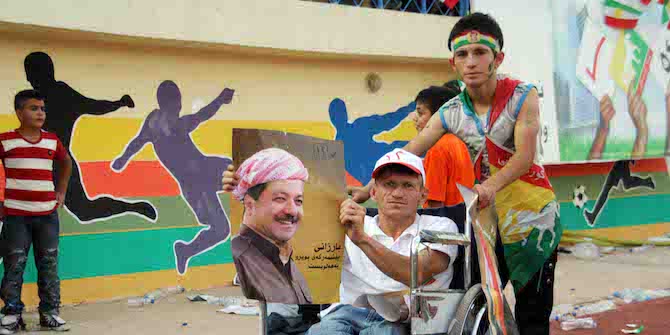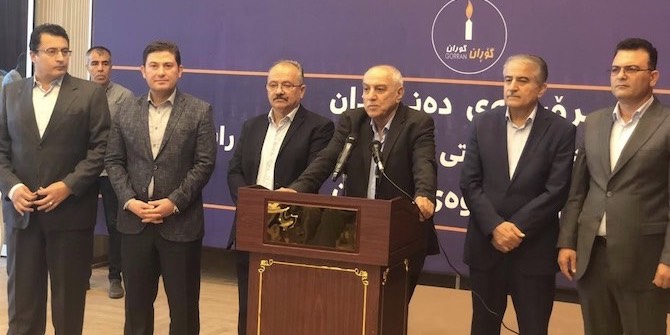by Bekir Aydoğan

The Barzani family-led Kurdistan Democratic Party (KDP), based in Erbil, and the Talabani family-led Patriotic Union of Kurdistan (PUK), based in Sulaimaniya, have long dominated the politics of Iraq’s Kurdistan Regional Government (KRG). Historical, ideological and sociological differences between the two parties are said to lie at the root of their disagreements. The long-held mutual mistrust and conflict further stems from each accusing the other of collaborating with the enemy and betraying the Kurdish cause. With the near-total political dominance of these two strongest Iraqi Kurdish actors, any conflict between the KDP and the PUK hugely damages the KRG as a whole, whereas their collaboration is crucial for the region’s development. The disunity between the Barzani and Talabani factions within the KDP during the 1960s, the bloody infighting from 1994 to 1998 and lastly, following the 2017 independence referendum, the loss of oil-rich Kirkuk, betrayal allegations and more brewing conflicts between the KDP and PUK have shown how this rivalry is wont to imperil the significant gains the Iraqi Kurds have made. Considering the tense relations between the KDP establishment and the PUK’s new co-chairs – Jalal Talabani’s eldest son Bafel and nephew Lahur, elected on 18 February 2020 – unless steps are taken in order to institutionalise the dual administrations, relations between the parties could further deteriorate and again jeopardise any KRG gains.
Divisions within the KDP
The emergence of disagreements between the KDP and PUK is said to have been due to the quest for hegemony, as well as the ideological and sociological differences related to their leaders, followers and geographies. While the group led by the KDP’s first leader Mustafa Barzani was described as more tribal, internally well-disciplined, traditional and conservative, the rival group, mostly comprised of KDP politburo members led by Ibrahim Ahmed and Jalal Talabani, was distinguished as being more reformist, urban, revolutionary and left-leaning. Talabani had greater influence on the young and urban populations in Sulaimaniya with his reformist ideas, but Barzani’s traditional and nationalist discourse impressed people in the Barzan district and its surroundings.
These ideological and sociological divisions combined with a lust for absolute power sparked off violent intra-KDP disagreements and conflicts. Particularly during the 1960s and later, the two conflicting groups’ unilateral relations with the Baghdad government gave it the chance to play each faction off against the other, with the result that the Iraqi Kurds’ aspirations for autonomy were easily stifled. Following the dissolution of the 1970 Autonomy Agreements between Saddam Hussein and Mustafa Barzani due to the Algiers Agreement between Iraq and Iran in 1975, which ended Iran’s support for the Kurds against Iraq, the KDP faced a crisis and subsequently, the Ahmed-Talabani group formed the PUK. The establishment of the PUK formalised the rivalry and dichotomy between the two groups.
Making Dual Administration Permanent
The US-imposed no-fly zone in 1991 in northern Iraq both protected Iraqi Kurds from Saddam’s forces and resulted in an equal power-sharing arrangement between the KDP and PUK after the 1992 election. The bloody infighting the two groups engaged in between 1994–8 derived from disputes over energy revenues and power sharing, leading to the KDP seeking support from the same Ba’athist forces who had previously used chemical weapons against the Kurds, and the PUK being supported by Iran, who had used the Kurds to provoke Saddam. The result was once again seriously damaging for the Iraqi Kurds, leaving them close to losing their de facto autonomy in northern Iraq. The US-brokered Washington Peace Agreement between the KDP and PUK in 1998 made the duopoly permanent, institutionalising the separate administrations in Erbil and Sulaimaniya.
Due to their help in ousting Saddam Hussein in 2003, the US rewarded the Iraqi Kurds by ensuring official autonomy was written into the 2005 Iraqi Constitution. KDP leader Masoud Barzani was given the KRG presidency and the PUK leader Jalal Talabani was granted the Iraqi Presidency, forming an accommodation between the rival parties. The KDP and PUK’s decision to form a single list for the elections in 2004, and to arrange a fifty-fifty power sharing alliance in 2007, brought about stability, safety and development in the KRG, also culminating in economic and political achievements through joint relations with the Baghdad government. However, the power-sharing alliance – as it had in the 1990s – made the dual administration permanent and prevented the parties from institutionalising their divided structures under a single roof.
Moreover, the success of the Gorran Movement, a split from the PUK, in the 2009 election and the sickness of Jalal Talabani in 2012 led to an intra-PUK crisis. The KDP questioned the utility of its alliance with the politically weakening PUK, owing to the changing power balance in the KRG. Following this, both the results of the 2013 election – in which the PUK ran separately from the KDP and fell behind Gorran – and disputes over Barzani’s expired presidency ended the accommodation that had been reached between the two parties. Coming under intense criticism because of budget cuts, failure to pay civil servants’ salaries, accusations of holding an ‘illegal’ presidency and mass protests, KRG president Masoud Barzani held an independence referendum for the region on 25 September 2017, which was regarded by the opposition as an effort to bolster Barzani’s sinking popularity. The PUK nevertheless did not publicly oppose the referendum, as they could not be seen as opposing efforts towards achieving independence. However, the Talabani clan’s 16 October withdrawal of Peshmerga forces from Kirkuk in the face of the Iraqi army triggered major tension and accusations of betrayal, leaving the Kirkuk oil fields in the hands of Baghdad and the Iraqi Kurds in an economic and political crisis. KDP accusations against Bafel, Lahur and Aras Talabani, alleging that they collaborated with Iranian General Qasem Soleimani and the Baghdad government to retreat from Kirkuk, have once again resurfaced. Conflicting allegations and infighting cost the KRG oil-rich Kirkuk, which produced nearly half of its energy revenues, and almost all the disputed areas are now under the control of Baghdad. Furthermore, any chance of institutionalising the dual administrations has been put on ice for the foreseeable future.
Conflict or Institutionalising?
Although the KRG has had de facto autonomy since 1991, made official in 2005, as well as the support of Western countries in order to institutionalise its divided administrations, critics point out that it still maintain almost the same dual administrative structure as it had in the 1990s. The two parties have been criticised for putting the interests of their family, tribes and party allegiance above the interests of the Iraqi Kurds. Though there are opposition parties, elections and a joint parliament, the KDP and PUK have their own intelligence agencies and Peshmerga units that further disunity. Such conflicts and divided administrations are, perhaps, the biggest obstacles facing Iraqi Kurds. Terms often used in the context of Iraqi Kurdish politics include ‘Birakuji’, meaning fratricidal war, and ‘Cahş’, literally meaning ‘donkey-foal’ but referring to those who collaborate with the enemy – demonstrating how disunity, conflict and allegations of betrayal mark Kurdish history.
Following the announcement of the PUK’s new co-chairs, Bafel and Lahur, the party is expected to seek to regain its status and parity with the KDP, hoping to wield the power the party used to have during the late Iraqi President Jalal Talabani’s era, with the PUK icon having died in 2017. Today, there are two options for the Iraqi Kurds. First is the continuation of a conflict-loaded dual administration, damaging the Kurds’ interests and gains to date. Second – a formidable challenge – is putting all these family, tribe and party-based networks aside in an attempt to deal with allegations of corruption and nepotism, and subsequently institutionalising the separate party-led foundations.







Is DPM Talibani support Barzani’s endorsement of Erdogan’s war crimes, chemical weapons use, invasion into KRG, ? Does the rift remain ?